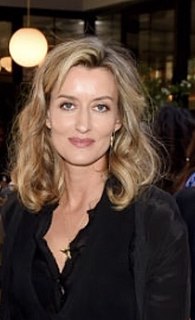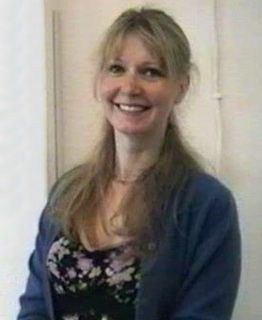A Quote by Natascha McElhone
My granny was very concerned that we weren't baptised - Mum had been desperate to escape her own Catholic upbringing. But Granny thought we were blighted. Whenever we turned up at her house, she would flick holy water - from the font she kept by the door - over us, in the hope that it would save us from damnation.
Related Quotes
We worked all the time, just worked and then we would be hungry and my mother was clearing up a new ground trying to help feed us for $1.25 a day. She was using an axe, just like a man, and something flew up and hit her in her eye. It eventually caused her to lose both of her eyes and I began to get sicker and sicker of the system there. I used to see my mother wear clothes that would have so many patches on them, they had been done over and over and over again. She would do that but she would try to keep us decent.
For the first time in her life Granny wondered whether there might be something important in all these books people were setting store by these days, although she was opposed to books on strict moral grounds, since she had heard that many of them were written by dead people and therefore it stood to reason reading them would be as bad as necromancy. Among the many things in the infinitely varied universe with which Granny did not hold was talking to dead people, who by all accounts had enough troubles of their own.
She'd assumed she'd be married and have kids by this age, that she would be grooming her own daughter for this, as her friends were doing. She wanted it so much she would dream about it sometimes, and then she would wake up with the skin at her wrists and neck red from the scratchy lace of the wedding gown she'd dreamed of wearing. But she'd never felt anything for the men she'd dated, nothing beyond her own desperation. And her desire to marry wasn't strong enough, would never be strong enough, to allow her to marry a man she didn't love.
Ultimately I think I learned a lot from my mother - the way she used fashion to make herself feel better; it was a tool she had and she used it very well. Fashion for her wasn't so far as an escape, but certainly a time where she would sit on her own and prepare what she wanted to wear the next day - it turned into bit of a ritual.
She didn’t understand why it was happening,” he said. “I had to tell her she would die. Her social worker said I had to tell her. I had to tell her she would die, so I told her she was going to heaven. She asked if I would be there, and I said that I would not, not yet. But eventually, she said, and I promised that yes, of course, very soon. And I told her that in the meantime we had great family up there that would take care of her. And she asked me when I would be there, and I told her soon. Twenty-two years ago.
What do you think it would have been like if Valentine had brought you up along with me? Would you have loved me?" Clary was very glad she had put her cup down, because if she hadn't, she would have dropped it. Sebastian was looking at her not with any shyness or the sort of natural awkwardness that might be attendant on such a bizarre question, but as if she were a curious, foreign life-form. "Well," she said. "You're my brother. I would have loved you. I would have...had to.
At the door , she made him promise to go without goodbyes .She closed the door on him . Laila leaned her back against it , shaking against his pounding fists , one arm gripping her belly and a hand across her mouth , as he spoke throughout the door and promised that he would come back for her . She stood there until he tired , until he gave up , and then she listened to his uneven footsteps until they faded , until all was quiet , save for the gunfire cracking in the hills and her own heart thudding in her belly , her eyes , her bones .
Granny bit her lip. She was never quite certain about children, thinking of them-when she thought about them at all-as coming somewhere between animals and people. She understood babies. You put milk in one end and kept the other as clean as possible. Adults were even easier, because they did the feeding and cleaning themselves. But in between was a world of experience that she had never really inquired about. As far as she was aware, you just tried to stop them catching anything fatal and hoped that it would all turn out all right.
From an early age she had developed the art of being alone and generally preferred her own company to anyone else’s. She read books at enormous speed and judged them entirely on her ability to remove her from her material surroundings. In almost all the unhappiest days of her life she had been able to escape from her own inner world by living temporarily in someone else’s, and on the two or three occasions that she had been too upset to concentrate she had been desolate.
There was another reason [she] took her books whenever they went away. They were her home when she was somewhere strange. They were familiar voices, friends that never quarreled with her, clever, powerful friends -- daring and knowledgeable, tried and tested adventurers who had traveled far and wide. Her books cheered her up when she was sad and kept her from being bored.



































